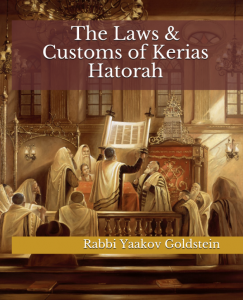Today’s Halacha is an excerpt from our soon to be Published Sefer
To purchase dedication pages and help support our work see here
The Mitzvah of Kerias Hatorah-Who established it & Why?[1]
Moshe Rabbeinu established for the Jewish people that they are to read from the Torah scroll on Shabbos, Yom Tov, Yom Kippur, Rosh Chodesh, Chol Hamoed, and Monday’s and Thursday’s. [This reading is of Rabbinical status.[2]] Ezra established for the Torah to be read also on Mincha of Shabbos.[3] [The Sages in the Mishnaic era established that the Torah be read also on fast days.[4] The Sages in the second Temple era established that the Torah be read on Chanukah and Purim.]
The reason why the Torah reading was established on Shabbos, Mondays and Thursdays: The verse[5] states that that the Jewish people walked three days in the desert and did not find water. The Talmud[6] states that the preachers [i.e. Dorshei Reshumos] explained that the term water in the verse refers to Torah, and the verse is stating that since they went three days without Torah, they became confounded. Therefore, the prophets of those days stood and established for the Jewish people that they read the Torah on Shabbos, and again on Monday, and again on Thursday, in order so they do not pass three days without Torah. [The daily Shema recital does not suffice as a substitute, as one is required to be engaged in Torah learning, and not just reading. Likewise, perhaps one is required to read from the actual words written in a scroll.[7] Likewise, the public reading gives one the merit of public Torah learning.[8] According to Kabballah, the reason the Sages established the Torah reading for Monday’s and Thursday’s is because these are days of judgment and require a connection of prayer with Torah learning.[9]]
The reason why the Torah reading was established on Shabbos by Mincha:[10] Ezra made the above Takana for the sake of the merchants who deal with their business and merchandise throughout all the days of the week and thus do not come to Shul and hear the Torah reading on Monday’s and Thursday’s. Therefore, Ezra established on their behalf, the reading of the Torah on Shabbos by Mincha, as then they are free and will come to hear it.
|
Summary: It was established for the Torah to be read on the following days: 1. Shabbos morning 2. Shabbos Mincha 3. Yom Tov 4. Yom Kippur 5. Monday 6. Thursday 7. Rosh Chodesh 8. Fast days Q&A May one read the Torah on days other than those mentioned above? It is forbidden to read the Torah with a blessing outside of any of the above mentioned days, and one who does so transgresses reciting a blessing in vain.[11] This applies even if one missed one of the days of Torah reading and desires to make it up.[12] Furthermore, one may not even take out the Torah to read without a blessing on days other than those listed above, [unless one has an accepted custom to do so based on Tzaddikim, such as for the night of Simchas Torah/Hoshana Raba, the Nessim, Shnayim Mikra, and the like].[13]
|
______________________________________________________________________________________________
[1] Admur 282:1; 13; 488:5; M”A 135:1; Rambam Tefila 12:1 “Moshe”; Rif Megillah 4; Bava Kama 82a that the prophets in the times of Moshe established it; Yerushalmi Megillah 4:1 “Moshe”; Miseches Sofrim 10:1; Mishneh Megillah 31a regarding Yom Tov; Chok Yaakov 429 regarding Yom Tov; See Kesef Mishneh ibid; M”B 135 in Pesicha; See P”M 135 A”A 1; Yesod Veshoresh Havoda p. 102; See Piskeiy Teshuvos 135:1
Opinion of Yerushalmi: In some Girsaos of the Yerushalmi ibid it states that Ezra established the reading of Mondays and Thursdays, however in truth the Rishonim on Megillah Bavli explain that Ezra only established the Aliyos, and therefore it was called on his name. According to the Girsa of the Rif and Rosh, in the Yerushalmi, this is explicitly stated.
[2] Tosafus Megillah 17b “Kerias Hatorah is not Biblical but rather Rabbinical”; Implication of all Poskim who write that Zachar is Biblical, hence excluding all other Parshiyos; Birkeiy Yosef 135; Peri Chadash 139:8; P”M 135 A”A 1 that so is implied from Setimas Haposkim in 135 and 685; Piskeiy Teshuvos 135:2 footnote 11
Other opinions: Some Poskim rule that Kerias Hatorah on Shabbos is a Biblical obligation. [Bach 685 and that so is opinion of Rashi, brought and negated in P”M ibid, brought in Taz 685:2]
Why was this Mitzvah counted as one of the seven rabbinical commands? See P”M ibid; Piskeiy Teshuvos ibid
[3] Admur 292:2 “Ezra established that three people be called to read the Sefer Torah in the congregation, every Shabbos by Mincha time”; M”A 135:1; Bava Kama 82a; Yerushalmi Megillah 4:1; M”B 135 in Pesicha
[4] P”M 135 A”A “Is from a Takana of the Gemara”; Yerushalmi Taanis 2:14; Miseches Sofrim 17; Rambam Taanis 1:17
[5] Shemos 15:22
[6] Bava Kama 82a
[7] See P”M 135 A”A
[8] Toras Chaim Sofer 135
[9] Siddur Shelah
[10] Admur 292:2; Bava Kama 82a
[11] See Biur Halacha 135 “Shabbos”; Meishiv Davar [Netziv] 16; Mishneh Halachos 4:33
[12] Biur Halacha ibid
[13] Mishneh Halachos 5:33; See Piskeiy Teshuvos ibid footnote 10



Leave A Comment?
You must be logged in to post a comment.